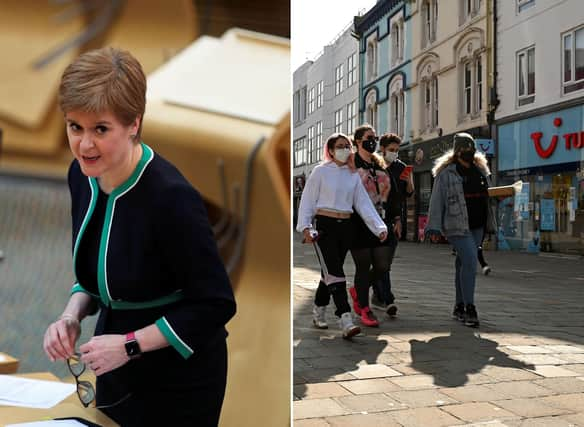Coronavirus in Scotland: Nicola Sturgeon considers 'further measures' as WHO warns of 'very serious' Covid surge in Europe


Nicola Sturgeon has said the Scottish Government are considering “further measures” to stop the rise in Covid-19 cases.
The First Minister was responding to reports the European director of the World Health Organisation (WHO) has warned national governments against reducing the quarantine period for people potentially exposed to coronavirus.
Advertisement
Hide AdAdvertisement
Hide AdDr Hans Kluge acknowledged Covid-19 "fatigue" is setting in, with growing public resistance to the measures, but said "even a slight reduction in the length of the quarantine" could have a significant effect on the spread of the virus.
Sign up to our free, daily newsletter service and we’ll bring the news direct to you
In a tweet on Thursday night Ms Sturgeon said: “COVID is accelerating across Europe.
"The Scottish Government will be considering carefully if further measures are needed to stem the increase. In meantime, please follow all advice on social gatherings & FACTS. And please download Protect Scotland.”
Yesterday Dr Kluge said coronavirus has returned to "alarming rates of transmission" in Europe this month.
He said in the past two weeks the number of new cases had doubled in more than half of European member states.
"We have a very serious situation unfolding before us," he said.
Dr Kluge insisted countries should only reduce the standard two-week quarantine period if it is scientifically justified.
Advertisement
Hide AdAdvertisement
Hide AdHe offered to convene scientific discussions on the issue, if necessary.
WHO Europe's 53-country region has recorded more than 300,000 confirmed coronavirus cases in the last week and more than half of the countries reported a rise of more than 10% in cases over the last two weeks, he said.
Of those countries, seven had their cases jump by more than two-fold.
Such statistics should be "a wake-up call for all of us", Dr Kluge said.
He called for "regional coherence" and said Europe's response has been effective when "prompt and resolute".
Dr Kluge added: "But the virus has shown (to be) merciless whenever partisanship and disinformation prevailed."
Last week, France cut its required quarantine time for people possibly exposed to someone with Covid-19 from 14 days to seven, saying many people do not observe the full two-week period anyway.
Katie Smallwood, WHO Europe's senior health emergency officer, said its recommendation that people quarantine themselves for 14 days after a possible exposure is based on the agency's understanding of the disease's incubation period and transmission patterns.
Advertisement
Hide AdAdvertisement
Hide Ad"We would only revise that on a basis of a change in our understanding of the science, and so far that's not the case," she said.
Ms Smallwood added several countries are considering reducing their required quarantine periods, a move that is not endorsed by WHO.
"We would really re-emphasise that our position is that a 14-day quarantine is important for patients that have been exposed to the virus," she said.
The two WHO Europe officials both wore masks during the video conference from Copenhagen.
Dr Kluge said his decision to wear a mask is "a clear signal that we are going into a worsening situation".
"At the moment ... we see a fatigue and resistance in the behaviour that is helpful" in fighting the virus," he explained.
"It's very important to give a signal, and certainly it's a strong sign of solidarity."
Dr Kluge said past successes in Europe suggest the continent is capable of suppressing the virus' recent rebound.
Advertisement
Hide AdAdvertisement
Hide Ad"In the spring and early summer, we were able to see the impact of strict lockdown measures," he said.
"Our efforts, our sacrifices, paid off. In June, cases hit an all-time low.
"The September case numbers, however, should serve as a wake-up call for all of us."
Comments
Want to join the conversation? Please or to comment on this article.